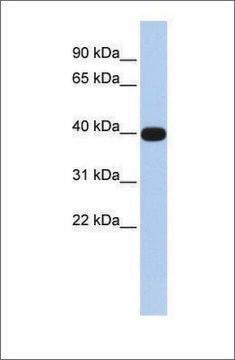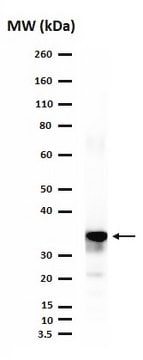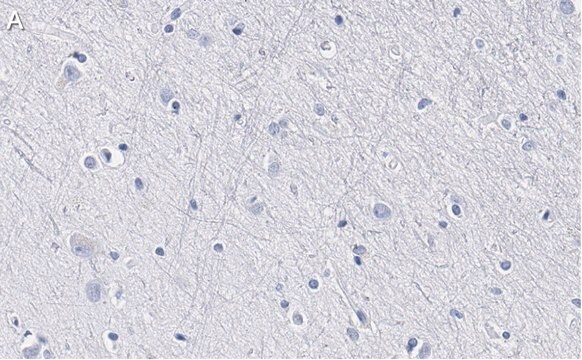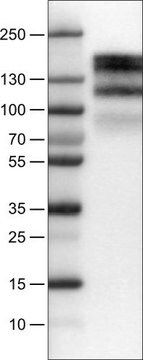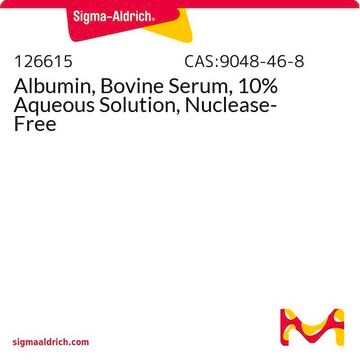ZRB1373
Anti-LMX-1 Antibody, clone 4L12, ZooMAb® Rabbit Monoclonal

recombinant, expressed in HEK 293 cells
Synonyme(s) :
LIM homeobox transcription factor 1-alpha, LIM/homeobox protein 1, LIM/homeobox protein LMX1A
About This Item
Produits recommandés
Source biologique
rabbit (recombinant)
Niveau de qualité
Produit recombinant
expressed in HEK 293 cells
Conjugué
unconjugated
Forme d'anticorps
purified antibody
Type de produit anticorps
primary antibodies
Clone
4L12, monoclonal
recombinant monoclonal
Gamme de produits
ZooMAb® learn more
Forme
lyophilized
Poids mol.
calculated mol wt 42.80 kDa
observed mol wt ~50 kDa
Espèces réactives
human
Réactivité de l'espèce (prédite par homologie)
hamster
Conditionnement
antibody small pack of 25 μL
Caractéristiques du produit alternatif plus écologique
Waste Prevention
Designing Safer Chemicals
Design for Energy Efficiency
Learn more about the Principles of Green Chemistry.
Validation améliorée
recombinant expression
Learn more about Antibody Enhanced Validation
sustainability
Greener Alternative Product
Technique(s)
affinity binding assay: suitable
immunocytochemistry: suitable
immunohistochemistry: suitable
western blot: suitable
Isotype
IgG
Numéro d'accès UniProt
Autre catégorie plus écologique
, Aligned
Conditions d'expédition
ambient
Température de stockage
2-8°C
Modification post-traductionnelle de la cible
unmodified
Informations sur le gène
human ... LMX1A(4009)
Description générale
Each ZooMAb antibody is manufactured using our proprietary recombinant expression system, purified to homogeneity, and precisely dispensed to produce robust and highly reproducible lot-to-lot consistency. Only top-performing clones are released for use by researchers. Each antibody is validated for high specificity and affinity across multiple applications, including its most commonly used application. ZooMAb antibodies are reliably available and ready to ship when you need them.
Learn more about ZooMAb here.
Spécificité
Immunogène
Application
Immunohistochemistry (Paraffin) Analysis: A 1:1,000 dilution from a representative lot detected LMX-1 in mouse embryo and human brain tissue sections.
Affinity Binding Assay: A representative lot of this antibody bound recombinant Human LMX-1 protein with a KD of 1.1 x 10-6 in an affinity binding assay.
Note: Actual optimal working dilutions must be determined by end user as specimens, and experimental conditions may vary with the end user.
Description de la cible
Forme physique
Reconstitution
Stockage et stabilité
Informations légales
Clause de non-responsabilité
Vous ne trouvez pas le bon produit ?
Essayez notre Outil de sélection de produits.
Code de la classe de stockage
11 - Combustible Solids
Classe de danger pour l'eau (WGK)
WGK 2
Faites votre choix parmi les versions les plus récentes :
Déjà en possession de ce produit ?
Retrouvez la documentation relative aux produits que vous avez récemment achetés dans la Bibliothèque de documents.
Contenu apparenté
Discover cancer research resources with modeling and profiling tools for cell culture, genomics, biomarkers, and more to help maximize your cancer research.
Discover cancer research resources with modeling and profiling tools for cell culture, genomics, biomarkers, and more to help maximize your cancer research.
Discover cancer research resources with modeling and profiling tools for cell culture, genomics, biomarkers, and more to help maximize your cancer research.
Discover cancer research resources with modeling and profiling tools for cell culture, genomics, biomarkers, and more to help maximize your cancer research.
Notre équipe de scientifiques dispose d'une expérience dans tous les secteurs de la recherche, notamment en sciences de la vie, science des matériaux, synthèse chimique, chromatographie, analyse et dans de nombreux autres domaines..
Contacter notre Service technique